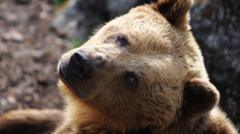Slovakia's government has garnered attention with its recent decision to permit the sale of brown bear meat, a move that follows a controversial plan to cull around 350 of the country's 1,300 brown bears. This decision was prompted by a surge in bear-related incidents, including fatal attacks, which the government attributes to overpopulation.
Last month, the cabinet voted to allow the shooting of a significant number of bears, which critics, including opposition politicians and conservationists, argue poses a serious threat to the species, listed as "near threatened" by the World Conservation Union. Environmentalists are particularly concerned as they claim the government is prioritizing public sentiment over conservation laws.
State Minister Filip Kuffa defended the initiative, stating that it would be wasteful for the culled bears to go to waste. He insisted that properly vetted bear meat will be available for public consumption, emphasizing that it is edible. The meat can be sold starting next week by organizations accredited under the environment ministry, given they adhere to legal and health regulations.
The issue of bear attacks has increasingly polarized public opinion in Slovakia, especially following a notable incident earlier this year wherein a man was killed by a bear in Central Slovakia. Prime Minister Robert Fico has argued that his government's actions are necessary to mitigate risks to the public, mentioning that expecting people to safely access woodland areas is vital.
However, critics argue that the culling is misguided and ineffective in preventing attacks. Michal Wiezik, an ecologist and opposition MEP, deemed the plan absurd and highlighted that many encounters with bears do not result in aggression. Environmental groups, like Greenpeace Slovakia, have labeled the culling plan "reckless," claiming that it contravenes both conservation directives and scientific recommendations.
In the broader context, bear meat is not widely consumed across Europe, often regarded as a delicacy in select regions. The health risks associated with consuming bear meat, specifically the Trichinella parasite, have sparked warnings from health officials, necessitating rigorous testing for safety before sale. These stringent requirements underline the complexity and potential hazards involved in the Slovak government's ambitious plan for bear meat commercialization amidst ongoing conservation debates.


















